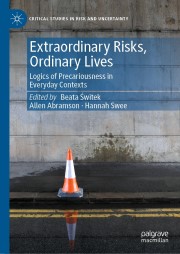Commentary: Clear and Present Danger—Dodging and Dealing with Risk and Uncertainty in Everyday Life
 Associate Professor Atreyee Sen contributed to the book 'Extraordinary Risks, Ordinary Lives' by Switek et al. with this chapter. The book is part of the book series 'Critical Studies in Risk and Uncertainty' edited by Patrick Brown, Anna Olofsson and Jens O. Zinn.
Associate Professor Atreyee Sen contributed to the book 'Extraordinary Risks, Ordinary Lives' by Switek et al. with this chapter. The book is part of the book series 'Critical Studies in Risk and Uncertainty' edited by Patrick Brown, Anna Olofsson and Jens O. Zinn.
In this chapter the author explores aspects of distrust, conflict, and guilt over the burden of acknowledging extraordinary risks, mainly through ordinary narratives of bitterness displayed by former Tibetan prisoners in Dharamsala. A small town located in the scenic Kangra Valley in Himachal Pradesh, one of the states along the foothills of the Indian Himalayas, Dharamsala is the exile home of thousands of Tibetan political prisoners.
The author highlight some of the ways in which groups of political prisoners harnessed diverse material cultures to endorse their experiences of political activism, arrest, and incarceration in China, with the intention of building a powerful political future within a rapidly modernising Tibetan refugee community. The ethnographic material collected from my fieldwork frames and intersects with the analysis of risk and danger embedded in the chapters by Kolling, Blasimme, and Trueba.
Citation
Sen, A. (2022). Commentary: Clear and Present Danger—Dodging and Dealing with Risk and Uncertainty in Everyday Life. In: Świtek, B., Abramson, A., Swee, H. (eds) Extraordinary Risks, Ordinary Lives. Critical Studies in Risk and Uncertainty. Palgrave Macmillan, Cham. https://doi.org/10.1007/978-3-030-83962-8_5
Download
The chapter is available at https://link.springer.com/chapter/10.1007/978-3-030-83962-8_5
